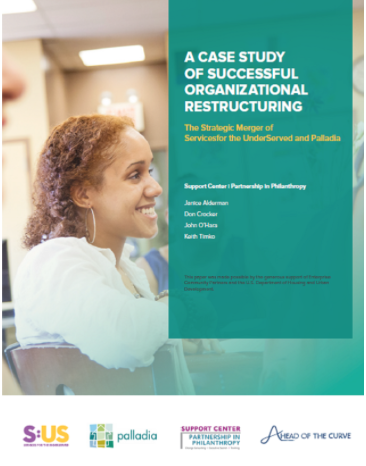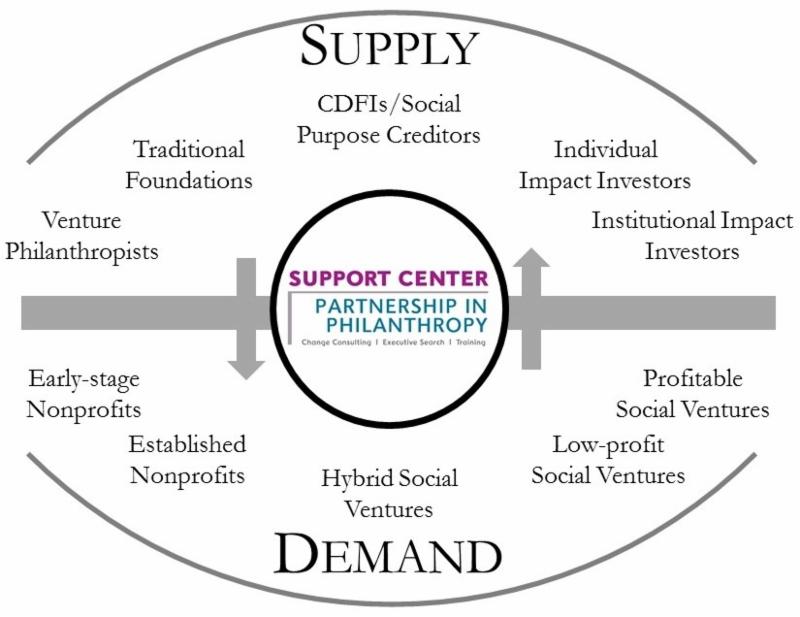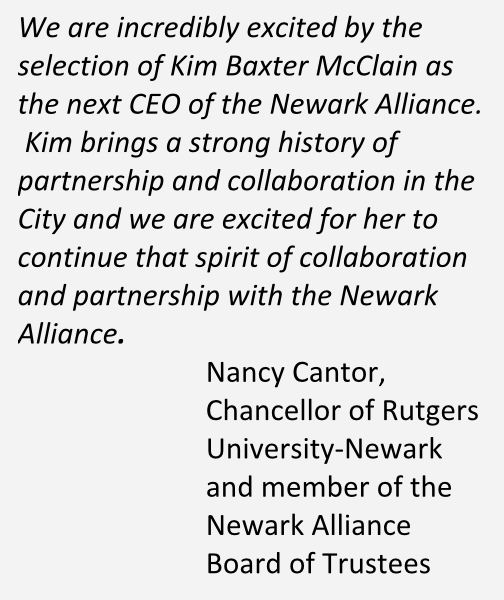
Ahead of the Curve Initiative and
September 28, 2016
Symposium
In 2016, the Ahead of the Curve initiative took shape with a series of meetings and events designed to build upon research undertaken by the Human Services Council and Sea Change Capital Partners about the role of risk management in the sustainability of nonprofit organizations.
On September 28, 2016, a consortium of capacity building organizations held a symposium in New York City to "advance the collective knowledge of the discipline of risk management" within the nonprofit sector. With close to 200 people in attendance, the symposium brought together nonprofit executives, managers and trustees as a well as representatives of capacity building organizations, consultants and academics. Using a design- thinking approach, Ahead of the Curve focused on how
to
frame and define risk for nonprofit organizations; what tools are nonprofits using to meet the risk management challenges they see; and how capacity building organizations can be most effective in supporting nonprofit understanding of risk.
Panelists collectively emphasized the importance of embracing risk and proactively managing it, linking this approach to creating healthy, sustainable organizations. Based upon a blend of short, reflective panels and generative small group discussions, the following are the major takeaways from the day.
-
Nonprofits have valuable assets
requiring
the development and implementation of
a holistic attitude towards
risk management. These include an
awareness of market risks, an
innate knowledge of
organizational
risk
,
a commitment to sustainability, , and
skillfulness
in implementing new programs and systems (particularly evident in a nuanced understanding of how to use communication and culture to operationalize risk management).
-
Risk is not all about the "negatives." Positive risks provide opportunities for growth and change, and risk management provides a path for achieving a healthy, sustainable organization.
-
Nonprofit leaders want support so that they can operationalize risk management.
Thus,
there
is a need for best practices, tools, networks, facilitation and consultants. An information and resource sharing website, like the one being created by the
Ahead of the Curve
Steering Committee, is needed.
-
The discipline of risk management needs to be built around collaboration and communication and
integrated
into a nonprofit's planning and operations.
-
Proactively protecting an organization f
inancial and contract risks are a top
priority.
Other areas
requiring ongoing evaluation of risk
include governance/leadership, reputation, compliance, quality of services and safety, growth, innovation and external risks.
A final copy of the Ahead of the Curve proceeding should be available in mid-December.
|

Building Our Understanding of What Works: Services for the
Unde
rserved-Palladia Merger Case Study Publication
Over the winter of 2015-2016, the Support Center embarked on a case study of a
successful merger we helped to facilitate between Services for the UnderServed, Inc. (SUS) and Palladia, two 35+ year-old human services agencies working in New York City.
Annually these organizations provided services for several tens of thousands of individuals and families facing challenges including mental illness, intellectual/developmental disabilities, homelessness, substance use, poverty, unemployment, and HIV/AIDS. Prior to the merger, the organizations respectively had annual operating budgets in excess of $120 million and $40 million and employed more than 1,200 and 500 people. The merger was formalized in December 2014, and
today the merged organization operates under the SUS name.
The resulting
case study
released in the summer of 2016 analyzes the entirety of the merger process from the initial self-study period to final integration, and highlights the value of outside funding and consulting support. The executive and board leadership of SUS and Palladia executed the merger by thinking strategically early on, creating the conditions for success and involving partners where needed. The Support Center was one of several organizations that served in a third-party role to help effect the merger; others included Enterprise Community Partners, the Robin Hood Foundation, SeaChange Capital Partners and the Nonprofit Finance Fund. Enterprise Community Partners has been actively engaged as a long-term and vitally important partner of both SUS and Palladia, contributing nearly $38 million in investments, grants and loans. The Robin Hood Foundation, SeaChange Capital Partners and the Nonprofit Finance Fund, among others, made critical investments in the merger effort.
The case study concludes with numerous "keys to success" and "lessons learned," and there are several in particular that reflect the Support Center's core work. These include:
-
Investment in building a strong board is worth the effort and a key to success when exploring restructuring;
-
Nimble "outside assistance" is essential to merger success; and
-
The challenge of integration, particularly cultural integration, is hard to predict and takes time and resources.
The importance of these points resonates throughout the nonprofit sector, and the case study is intended to help organizations and funders understand both the complexity of undertaking a merger and the benefits that can be gained through a well-designed process. More information about our work on mergers and strategic restructuring can be found
here
. We are also developing a series of video case studies that explore the before, during and after of the merger process that will be available on www.youtube.com/supportcentermedia.
|
|
 |
|
 |
|
Stronger Together Builds Momentum: A Focus on Partnerships and Collaboration
In June, the Support Center partnered with the NYC Department of Youth and Community Development (DYCD) and Community Resource Exchange (CRE) to organize
Stronger Together
, a one-day institute for small nonprofits to explore ways to partner for greater efficiency and impact - from sharing back-office resources to creating joint programming to merging organizations. Participants learned about best practices from leaders of foundations, nonprofit umbrella organizations, government agencies, strategy experts and experienced practitioners. Experts were on hand to provide on-the-spot assistance to organizations interested in exploring partnership options.
Plenary speakers included: Keith Timko, Executive Director, Support Center; Katie Leonberger, President & CEO, Community Resource Exchange; John MacIntosh, Partner and Board Member, SeaChange Capital Partners; Luz Rodriguez, New York Lead, Foundation Center; and Alan Scher, Managing Director, Youth and Family Services at YM and YWHA of Washington Heights and Inwood.
The gathering resulted in five big ideas that will inform our work going forward (full report available
here
.) These include:
-
Human Resources, Staffing and Volunteer Management:
What if we could create an online "exchange" highlighting organizational needs and resources-e.g. space or marketing capacity-that could come together collaboratively?
-
Financial and Risk Management in Collaboration:
Is there a way to make collaboration facilitation and consulting more widely available to achieve shared and individual goals for organizations that are interested in collaborating?
-
Community Collaboration:
How can DYCD create collaboration-oriented grant opportunities and host events for grantors and grantees to share stories and establish common ground?
-
Marketing and Fundraising Partnerships:
Could we create a group of ambassadors who represent a consortium of similarly aligned nonprofits and spread a unified message about their purpose and work? Ambassadors would represent the common mission of the organizations, enlarge the network of supporters, contribute to development efforts, and alleviate some staff burdens when organizations undertake this work alone.
-
Bold Ideas in Collaboration from Shared Space to Merged Programs:
Can we create and elevate platforms for storytelling so that the good work of nonprofits is heard and valued and disseminated further?
|

Engaging with the
Impact Economy
Since 2014, the Support Center has worked with
Rutgers Business School
, the NJ
Office of Faith Based Initiatives
, the Center for Nonprofits (NJ), Pro Bono Partnership and NJ Community Capital to connect local social entrepreneurs with a range of financial and human capital (see accompanying diagram for how we visualize this work). In 2016, we launched a series of "impact investment gatherings" to connect investors, lenders, and funders with earned income-generating nonprofits and mission-driven for-profit social ventures that are creating demonstrable social impact.
Across two gatherings-May 4, 2016 at Rutgers Business School in Newark and November 4, 2016 at Rutgers Business School in Piscataway-a total of 13 NJ-based social enterprises, representing innovative and diverse ventures presented. The opportunity allowed the organizations to present their business models and investment pitch and demonstrate the impact they are having in their communities. The featured social ventures included:

|
Attendees learned about investment, funding, and capacity building opportunities available to help these enterprises increase scale, serve more people and create social change. It also offered the chance to network with other organizations and enterprises addressing a wide range of social and environmental issues throughout NJ.
|
|
 Profile: A Look at Our Executive Transition Work in Newark
Profile: A Look at Our Executive Transition Work in Newark
In 2016, the Support Center worked with the Prudential Foundation to support two key executive transitions in Newark: the Newark Trust for Education and the Newark Alliance. In the case of the Newark Alliance, we worked with the board to develop criteria for the organization's next leader and worked closely with a Transition Committee to identify, interview and ultimately select the organization's next leader. We worked closely with the Transition Committee to understand the organization's mission of working in "partnership to make Newark a better, safer place to work, live, learn, play and do business" and the organization's future direction.
On May 18, 2016, the Newark Alliance officially named Kimberly Baxter McLain as its next Chief Executive Officer and Dennis Bone as the new Chair of its Board of Trustees effective July 2016. McLain had served the last four years as President and Chief Executive Officer of the Fund for Newark's Future (FNF) where she led the organization's day-to-day operations and carried out its strategic vision, which was aimed at improving educational opportunities and outcomes for Newark's children. Upon her hiring, McClain commented, "Great things are happening in Newark, and we can only continue to reach new heights if we bring everyone to the table to construct an integrated, collaborative, and aligned plan for the city's long-term economic prosperity that leaves no one behind. I am humbled to follow those that came before me as I lead the organization into its next phase of impact for the entire Newark community."
|
|
2016: The Year in Review by the Numbers
With support from donors large and small, we are proud of these 2016 accomplishments :
-
1,057:
The number of unique organizations in the region that we reached this year;
-
15:
Afterschool organizations in New York City that we are helping through a Department of Youth and Community Development program;
-
10
Business improvement districts and Community based Development Offices that the Support Center supported to make their neighborhood downtowns more vibrant;
-
9:
Community organizations in Newark, NJ that can better serve the community as a result of our one-on-one consulting projects;
-
6 and 12:
Executive searches and interim executive placements, respectively, that are helping organizations to thrive over the long-term;
-
29:
Newly trained interim executive directors after a June 2016 training;
-
14:
New Jersey-based social enterprises that participated in impact economy gatherings;
-
Over 2,000:
Registrations across
10
panels, conferences, gatherings and special events representing
over 1,000 unique
organizations;
-
1,653
: The number of registrations across
75
workshops and webinars connecting us with
679
unique organizations.
|
|
2016 Funding and Programmatic Partners
Special thanks to the following foundations, corporations and government agencies who have helped to underwrite our work in 2016.
|
Altman Foundation
Booth Ferris Foundation
Clark Foundation
Educational Foundation of America
Foundation for Newark's Future
Horizon Foundation of New Jersey
Hyde & Watson Foundation
Johnson & Johnson
JPMorgan Chase
New York Community Trust
|
NJ Office of Faith Based Initiatives NY Department of Youth and Community Development NYC Small Business Services Posner Wallace Foundation Prudential PSEG Seth Sprague Educational and Charitable Foundation Viking Global Investments
|
|
|
Ahead of the Curve Initiative
And thanks to the following organizations and individuals who helped us to celebrate Don Crocker's transition and to underwrite our "Ahead of the Curve" initiative.
Organizations:
Association of Nonprofit Specialists
Better Business Bureau of Metro NY
Build With Purpose
Cause Effective
Community Resource Exchange
Condon O'Meara McGinty & Donnelly
Council Services Plus, Inc.
Educational Foundation of America
Fiscal Management Associates
|
Growth for Good
JM Kaplan Fund
JP Morgan Chase Foundation
NY Council of Nonprofits
PSEG
Prudential
Seth Sprague Educational and Charitable Foundation
Services for the Underserved
TCC Group
|
Individuals:
Amy Holmes
Andrea Louie
Ben Roman
Bill Falahee
Carol Kurzig
Casey Castaneda
Daniel Zide
Dart Westphal
Diane Manning
Don Crocker
Doug Gould
Doug Sauer
Erin Siemers
Frank Abdale
George Suttles
Gilles Mesrobian
|
Harriet Joynes
Heather Robinson
Helene Blieberg
Jane Hanson
Janet Waterston
Jenn Goldstone
John Emmert
Joyce Isabelle
Kathleen Enright
Karen Brown
Kavita Mehra
Keith Timko
Laura Rossi
Laurel Eisner
Laurel Molloy
Lawson Shadburn
|
Melba Butler
Melissa Beck
Michael Davidson
Patricia Moran
Pat Richter
Peter Andrew
Peter Sullivan
Ralph Rogers
Richard Zambrotta
Richmond Rabinowitz
Sammi Collidge
The Siemers Family
Tonia Papke
Yanki Tshering
|
|
STAY CONNECTED
#SCworkshops
|
|
|
|
|